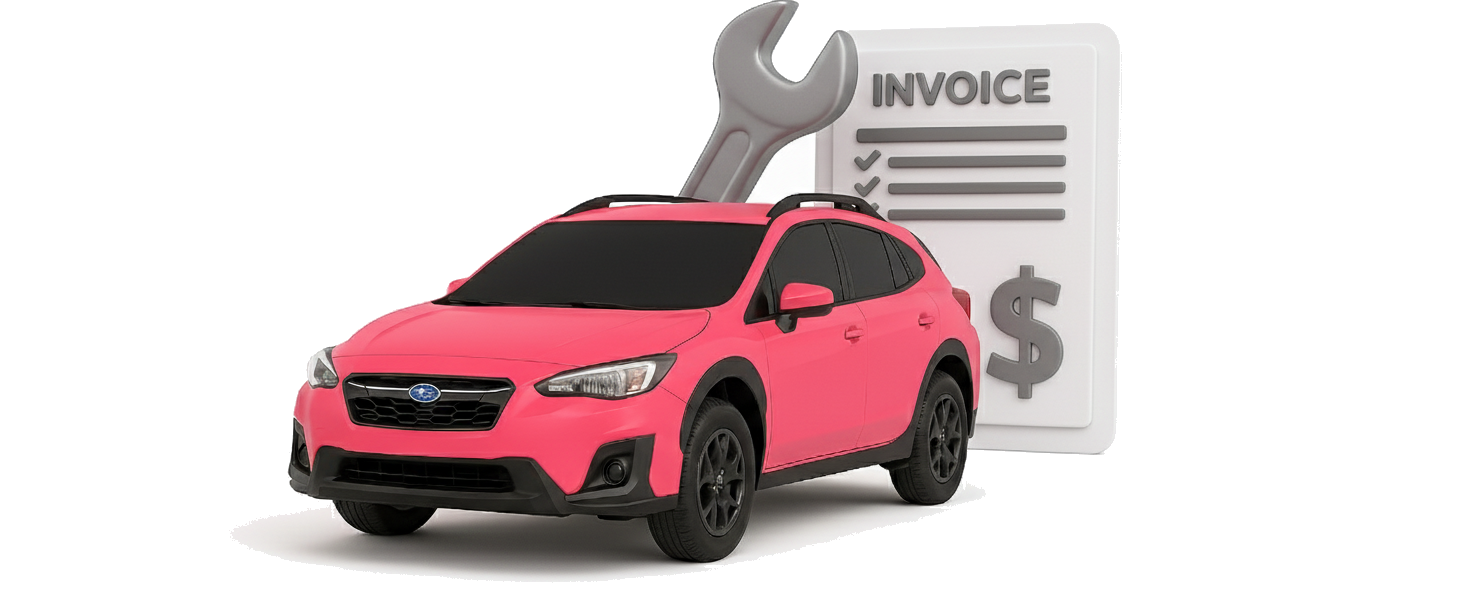The final price will depend on your exact car and location. The Jerry app helps customers get real quotes from nearby shops for this and other repairs.
Real customers Jerry has helped
Costs for getting your water pump repaired depend on your exact vehicle, where you live and the quality of parts used. With Jerry, you can quickly see what drivers are paying right now. Below are real examples of customers we’ve helped secure top prices for their water pump repair.
Estimates are modeled based on real vehicle and location data; names have been changed. Actual prices will vary by shop, parts, and vehicle condition.
Cost breakdown: Why prices vary
Each day, Jerry guides customers to competitive car repair prices, and we’ve seen the same main reasons why those prices can change:
Electric vs. mechanical pump:
Electric pumps can cost $300–$800 for the part vs. $50–$250 for mechanical pumps.
Cooling system condition:
Corroded fasteners or broken studs can add $50–$350 in labor and $50–$300 in parts (fasteners, crossover tubes).
Add-on parts and fluids:
Coolant ($20–$60), gaskets or sealant ($5–$30) and serpentine belt ($20–$80) are common. Thermostat replacement at the same time often adds $50–$200. Some engines use integrated pump/thermostat housings.
OEM vs. aftermarket parts:
OEM or OE-style water pumps usually cost more than basic aftermarket options, mainly because they’re built to match the original specs and tend to fit more consistently. If you’re going aftermarket, sticking with well-known brands like Aisin, Gates, Hepu, Graf, or Pierburg can help you avoid premature failures and repeat labor.
AWD, turbo or hybrid packaging:
Extra underbody panels, turbo piping or hybrid components can add $50–$250 in labor.
What is a water pump?
A water pump is the part that keeps coolant moving through your engine and radiator so temperatures stay in the safe zone. When it’s healthy, your heater works normally and the temperature gauge stays steady. It’s usually driven by a belt (or timing belt/chain, depending on the car).
If the water pump starts failing, you might notice coolant leaks up front, a whining or grinding noise, or the engine running hotter than usual. Because overheating can cause serious engine damage fast, it’s smart to get leaks or temperature spikes checked early—even if the car still drives “fine.”
Less than a year later, the car returned on a tow truck with a broken timing belt and bent valves. What could have been a single repair ended up costing much more in the long run. It’s a good reminder that building an honest related parts list isn’t about upselling—it’s about preventing larger, more expensive failures down the road.

Signs you need a water pump replaced
It pays to recognize the signs of water pump trouble. From working with real drivers on their car issues, Jerry has found these are the key things to look out for:
- Coolant leak: Puddles/drips (often pink, green, or orange) under the front of the car.
- Overheating: Temperature gauge climbs higher than normal, especially in traffic or on hills.
- Low coolant level: You’re topping off coolant more often with no obvious hose leak.
- Whining or grinding noise: A high-pitched whine or rough bearing sound from the front of the engine.
- Steam or sweet smell: Steam from under the hood or a sweet odor after driving (coolant on hot parts).
- Weak heat: Cabin heater blows lukewarm even when the engine is warmed up (can happen if coolant isn’t circulating well).
Your action plan: How to save money
Use this action plan to properly diagnose and resolve the issue. These steps will help you partner with your mechanic to make sure the repair is done correctly and efficiently.
Confirm the diagnosis:
Customers use the Jerry app to help them them be confident in their car issues before going to the shop.
Ask for options:
Compare OEM vs. reputable aftermarket pumps. Favor Aisin (Toyota/Subaru), Gates or Hepu/Graf/Pierburg (Euro).
Replace wear items while you’re there:
New serpentine belt, thermostat and fresh coolant help to prevent repeat labor. Hoses that feel spongy or crusty clamps are cheap insurance.
Bundle smartly:
If the pump is behind the timing cover, do the timing belt, tensioner and idlers now. The Jerry app helps customers get quotes for multiple services at once.
Get line-item pricing:
Ask for flat-rate hours, part brand/number, coolant spec, any single-use hardware (e.g., BMW aluminum bolts), bleed method, shop fees and warranty in writing.
Important note: If the temperature light comes on or the gauge spikes too hot, shut the engine down as soon as it’s safe. Driving while overheating can multiply your repair costs.
Related repairs
When you need a new water pump, you might want to look into other related services too—bundling them can lower your overall cost. Jerry makes it easy to compare reliable prices for several repairs at once.
- Thermostat: A sticking thermostat can cause overheating and shorten the life of the new pump.
- Coolant flush/refill: Old or contaminated coolant can corrode components and damage the new pump.
- Radiator cap: A weak cap can cause boiling/overflow issues and cooling system leaks under pressure.
- Drive belt(s) & tensioner: Worn belts or a weak tensioner can slip, squeal, and reduce pump performance.
- Hoses & hose clamps: Soft, swollen, or cracked hoses are common leak points—cheaper to replace while drained.
Pro tip: Ask your shop to inspect the whole system so you can make one efficient visit instead of two.
DIY vs. Pro: Can I do this myself?
Whether you’d rather replace your water pump yourself or have a pro handle it, Jerry can help you understand what you’ll pay for parts and shop labor. Here’s what to think about before deciding to DIY this repair.
Pro tip: If your engine is interference-design (many are), a timing mistake can bend valves. That’s when professional help is cheap insurance.
Get fast, apples-to-apples repair quotes with the Jerry app—compare brands, labor hours, coolant spec and warranty terms before you book.
What our customers are asking us
-
How long can I drive with a bad water pump?
-
How long does water pump replacement take?
-
Should I replace the timing belt with the water pump?
-
What causes water pumps to fail?
-
Do electric water pumps last longer?
-
Can stop-leak fix a pump leak?
-
What warranty should I expect?
-
How do I avoid repeat failures?
-
Can I get a price without calling around?
-
What’s is included in a proper water pump job?

Jerel Lawrence is an experienced and certified automotive technician with a strong foundation in diagnostics, repair and technical mentorship. A graduate of NASCAR Technical Institute in 2010, Jerel began his career at national automotive repair chain locations, where he earned eight certifications from the National Institute for Automotive Service Excellence (ASE).
From 2017 to 2022, he worked as a General Motors-certified technician at a Cadillac dealership, refining his skills in manufacturer-specific diagnostics and service procedures. Today, Jerel leads as the senior technician and mentor at a family-owned repair facility, where he helps guide the next generation of technicians while ensuring top-quality service.
In addition to hands-on work, Jerel contributes to the automotive community through writing detailed articles and answering technical questions to help vehicle owners better understand and care for their cars.

Everett Cook is an award-winning journalist and editor with more than 10 years of experience across a variety of industries. In editing for Jerry, Everett’s mission is to help readers have a better understanding of the costs of owning or leasing a car and to better understand their vehicle in terms of insurance and repairs. Prior to joining Jerry, Everett was an editor for Axios. His previous work has been featured in The New York Times, The Los Angeles Times, The San Francisco Chronicle, The Atlantic, Atlantic Re:think, The Boston Globe, USA Today, and others. He’s also been a freelance writer and editor with experience in SEO, audience building, and long-term content roadmaps. Everett is a proud graduate of the University of Michigan.








